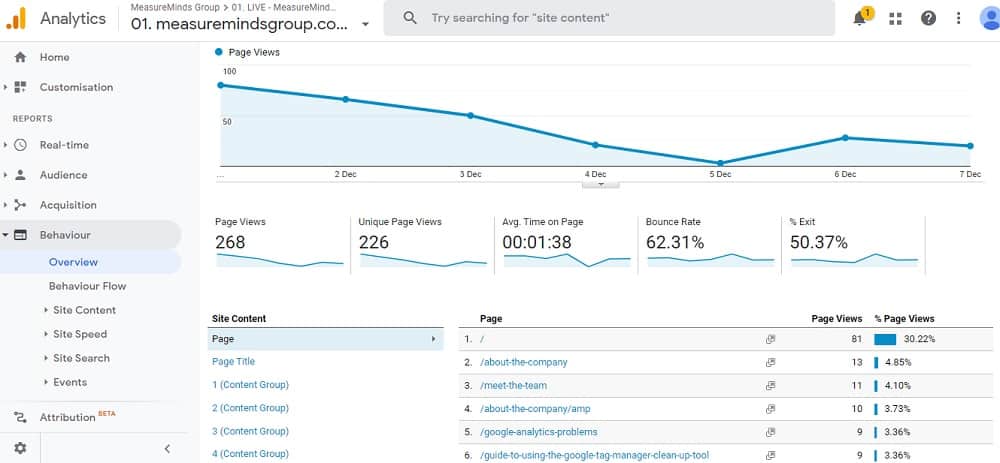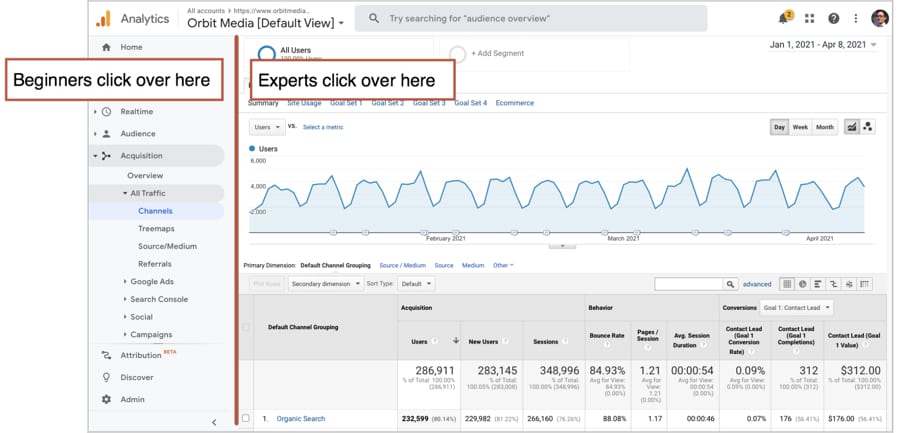When Does the Google Analytics Tracking Code Send an Event Hit to Analytics? Timing and Ideal Practices Explained
When Does the Google Analytics Tracking Code Send an Event Hit to Analytics? Timing and Ideal Practices Explained
Blog Article
Enhance Your SEO Technique With Effective Google Analytics Tracking Code
Including Google Analytics tracking code right into your SEO approach is an essential action towards attaining measurable results. Proper execution not just gives a clear window into user actions and website traffic sources yet also highlights vital performance indicators that can educate your material strategy. By recognizing metrics such as organic web traffic and conversion prices, you can identify locations for optimization. Nevertheless, real possible hinge on exactly how these understandings can be leveraged to improve your technique. What particular approaches can you embrace to make best use of the effect of this data on your SEO initiatives?

Understanding Google Analytics Basics
To successfully utilize Google Analytics for Search Engine Optimization, it is necessary to grasp its foundational principles. Google Analytics functions as an effective device for monitoring and assessing website web traffic, offering understandings that are vital for enhancing internet search engine performance. At its core, the platform enables individuals to keep an eye on individual actions, traffic resources, and key efficiency signs (KPIs) such as bounce prices and session durations.
Familiarity with the user interface is important. The Audience area provides demographic insights, helping to tailor web content to target users properly.
Recognizing metrics such as organic website traffic volumes and conversion prices is important for examining search engine optimization efficiency. Inevitably, understanding these fundamentals permits digital marketing professionals to harness the full potential of Google Analytics, driving notified choices that boost general search engine optimization strategies. By establishing a strong structure, organizations can successfully evaluate their efficiency and determine opportunities for improvement in their online visibility.
Establishing Up Monitoring Code
Appropriately establishing up the tracking code is vital for precise data collection in Google Analytics. The very first step includes developing a Google Analytics account and home, where you will certainly get a special monitoring ID. This ID is important for linking your site's information to your Google Analytics account.
Once you have your monitoring ID, incorporate the tracking code snippet right into your website's HTML. This is generally placed in the header section of each page to ensure it loads early in the web page rendering procedure. If you're utilizing a Material Management System (CMS) like WordPress, several plugins streamline this procedure, permitting you to add the monitoring code without straight HTML editing and enhancing.
After applying the tracking code, it is important to check its performance. If the monitoring code is properly installed and working, you can utilize the Google Tag Aide tool to verify. Additionally, monitor the real-time reporting function in Google Analytics to verify that information is being accumulated appropriately.
Guaranteeing that the monitoring code is effectively established lays the foundation for effective information analysis, allowing you to make enlightened choices to enhance your search engine optimization technique and overall internet site performance.
Key Metrics to Display
Recognizing key metrics to keep track of is vital for understanding the efficiency of your search engine optimization method via Google Analytics. By concentrating on specific information factors, you can evaluate the effect of check my source your optimization initiatives and make informed decisions to boost efficiency.
This statistics reflects the total health and wellness of your Search engine optimization approach. A high bounce price might indicate that your web content is not fulfilling individual assumptions or that your touchdown web pages need renovation.
Additionally, consider tracking conversion prices, as these metrics disclose exactly how well your website satisfies its service objectives, such as creating leads or sales. Search phrase positions are additionally vital; tracking adjustments in keyword positions assists review the efficiency of your targeted SEO initiatives. Finally, evaluate the typical session duration, which indicates individual engagement and web content relevance. By very closely complying with these key metrics, you can get useful understandings right into your SEO strategy's performance and identify areas for renovation.
Studying Customer Habits
Understanding user behavior is important for fine-tuning your Search engine optimization technique and optimizing website efficiency. Google Analytics supplies a riches of information on user engagement metrics, such as bounce rates, time on website, and page views per session.
In addition, tracking individual circulation can reveal common navigation paths, highlighting potential traffic jams or locations for renovation. Comprehending the demographics, rate of interests, and geographical places of your visitors enables more tailored web content that talks with their needs. Using division attributes in Google Analytics even more boosts your capability to analyze customer actions by permitting you to compare various target market teams.
Additionally, monitoring conversion prices and customer actions can provide insights right into the efficiency of your telephone calls to action and overall website design. This holistic view of individual behavior is vital for making educated choices that improve user experience and drive greater engagement, eventually adding to improved SEO efficiency.
Leveraging Insights for SEO
Regularly leveraging insights gotten from customer habits analysis can substantially boost your SEO efforts. By using Google Analytics, you can recognize key metrics such as bounce prices, session duration, and customer flow, which reveal just how site visitors engage with your web content. These insights allow you to identify locations requiring enhancement, such as high leave web pages or underperforming key words.

Furthermore, tracking natural web traffic sources offers quality browse around this site on which channels are most reliable, allowing you to designate sources tactically (when does the google analytics tracking code send an event hit to analytics?). By analyzing conversion prices alongside traffic data, you can identify which web pages drive real service results, improving your search engine optimization technique further
Including these understandings right into your web content technique not only enhances visibility yet also cultivates an extra user-centric method. Ultimately, a data-driven search engine optimization strategy notified by analytics not just increases positions yet additionally straightens your goals with user assumptions, bring about sustained growth and involvement.
Verdict
Efficient execution of Google Analytics tracking code substantially enhances a Search engine optimization technique by supplying vital insights right into user behavior and traffic sources. Ultimately, leveraging these understandings adds to fine-tuning Search engine optimization initiatives, driving more relevant traffic, and boosting overall web site efficiency.
Including Google Analytics tracking code right into your Search engine optimization approach is a critical action toward achieving quantifiable results. At its core, the system allows customers to monitor user behavior, web traffic sources, and crucial performance indications (KPIs) such as bounce prices and session durations.
Comprehending individual habits is critical for fine-tuning your Search engine optimization strategy and making the most of site performance.Continually leveraging understandings gotten from user habits analysis can significantly enhance your Search engine optimization efforts.Efficient application of Google Analytics tracking code considerably improves a Search engine optimization technique by providing crucial insights right into individual behavior and web traffic sources.
Report this page